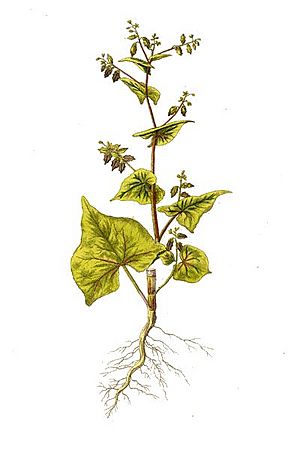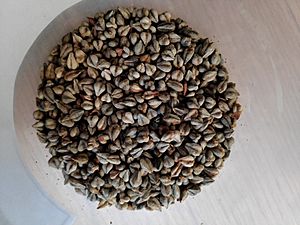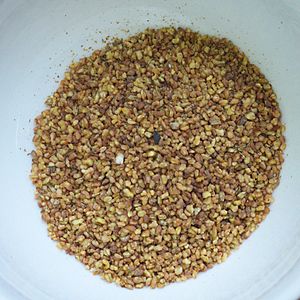Tartary buckwheat facts for kids
Quick facts for kids Tartary buckwheat |
|
|---|---|
 |
|
| Scientific classification |
|
| Kingdom: | Plantae |
| Clade: | Tracheophytes |
| Clade: | Angiosperms |
| Clade: | Eudicots |
| Order: | Caryophyllales |
| Family: | Polygonaceae |
| Genus: | Fagopyrum |
| Species: |
F. tataricum
|
| Binomial name | |
| Fagopyrum tataricum |
|
| Script error: The function "autoWithCaption" does not exist. | |
| Synonyms | |
|
|
Script error: No such module "Check for conflicting parameters".
Tartary buckwheat is a special plant grown for food. It is also known by names like green buckwheat or bitter buckwheat. This plant belongs to the Fagopyrum group, which is part of the Polygonaceae family.
Even though it's called "buckwheat," it's not a true cereal like wheat or rice. It's more like a distant cousin. Tartary buckwheat tastes a bit more bitter than common buckwheat. It also has many good things inside it, like rutin and other helpful plant compounds called flavonoids.
People first started growing Tartary buckwheat in East Asia. Today, you can find it growing in places like Europe and North America too. It's a very common food in the Himalayas and in parts of Southwest China, like Sichuan province.
This plant is grown in many parts of the world. However, if it grows by itself among other crops, farmers might see it as a weed.
What's Inside Tartary Buckwheat?
Tartary buckwheat is known for having special natural substances. These include things like rutin, which is a type of plant compound called a flavonoid. Flavonoids are good for you and can be found in many fruits and vegetables.
This plant also contains other helpful compounds. These include phenolic acids and quercitrin. These are all natural parts of the plant that give it its unique properties.
Its Unique Smell
Tartary buckwheat has its own special smell. This smell is different from common buckwheat (which is called Fagopyrum esculentum). For example, common buckwheat has a smell from something called salicylaldehyde. Tartary buckwheat does not have this. Instead, it has a different smell from a substance called naphthalene.
See also
 In Spanish: Fagopyrum tataricum para niños
In Spanish: Fagopyrum tataricum para niños



